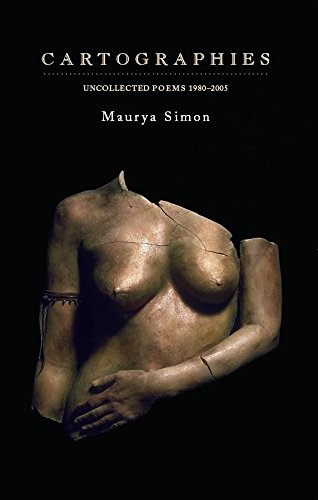Order: Amazon | Barnes & Noble | IndieBound | Books A Million
 The poems in Cartographies travel new territory, exploring the heart’s changeable cartography and the soul’s uneven terrain. They map the familiar, and always complex world of the San Gabriel Mountains, as well as nearby Los Angeles, with its cultural richness and social/political tensions. Divided into four sections―The Soul, The Self, Mountains, The City―Cartographies investigates our profound relationships with time, nature, love, and death.
The poems in Cartographies travel new territory, exploring the heart’s changeable cartography and the soul’s uneven terrain. They map the familiar, and always complex world of the San Gabriel Mountains, as well as nearby Los Angeles, with its cultural richness and social/political tensions. Divided into four sections―The Soul, The Self, Mountains, The City―Cartographies investigates our profound relationships with time, nature, love, and death.
Simon finds meaning in unexpected locales, from the “Rorschach” on a butterfly’s wings to a barrio bakery, and in the briefest of moments, evoked by the plaintive voice of a spider, or provoked by a breathless escape from an avalanche. These poems record the paradoxes present in our daily lives, those interstices of yearning and mourning or fear and celebration that reveal the deep wells and turbulence of human consciousness. Simon apprehends the elegiac within the purest moments of joy, and intimates catharsis within despair. She opens the mind’s windows to small miracles provoked by the barest glimmers of wonder and hope.
REVIEWS
“Cartographies is a read for anyone who loves poetry. You can love its carefully poised outsailings or its nimble shape or buoyant, zesty voice that’s enthusiastically into everything. I love it for the poet who writes wonderfully about dogs, about a tricky sister, about Burt Reynolds in the mall, about the Kuwaiti Zoo, all of which seems to support her saying “I do not like to think about my life.” These poems make me think I’d like to go to dinner with their author. Who wouldn’t? The art here is in making a life luminous.”
—Dave Smith
“Maurya Simon is tenacious in her struggle to comprehend the paths we travel between keening and dancing in a dangerous world. When her language does both, keen and dance, the results are beautifully urgent.”
—Dorothy Barresi, The Gettysburg Review
“Simon tries to see through things, as if they were composed of light rather than matter. And her vision leads the reader into a world rendered luminous, its radiance sharply, almost painfully defined. [Her] gospel is that everything—animate or inanimate—is potentially treasure.” —Alice Fulton, Poetry